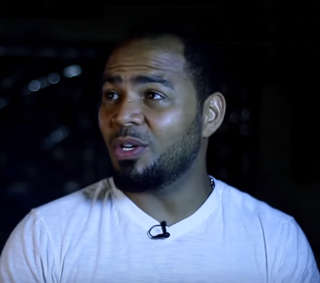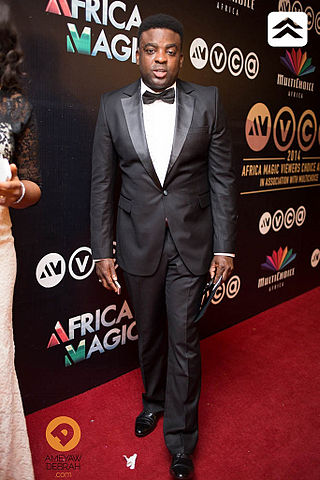This is a list of Nigerian films released in 1995.
This is a list of Nigerian films released in 1995.
| Title | Director | Cast | Genre | Notes | Ref | |
|---|---|---|---|---|---|---|
| 1995 | ||||||
| Ami Orun | Tunde Alabi-Hundeyin | Peju Ogunmola | Produced by Dudu Films | [1] | ||
| Dark Goddess | Andy Amenechi | Regina Askia Layi Ashadele Yinka Craig | Produced by Owoyemi Motion Pictures/Contech Ventures | |||
| Deadly Affair: A True Life Story | Chico Ejiro | Dolly Unachukwu | ||||
| Fatal Desire: A True Life Story | Zeb Ejiro | Sydney Diala | Produced by Andy Best Productions | |||
| Ikuku( Hurricane) 1 | Nkem Owoh Zeb Ejiro | Nkem Owoh Zach Orji Sam Loco | Shot in Igbo Language Released on VHS by Nonks/Andy Best | |||
| Koseegbe | Tunde Kelani | Wole Amele Toyin Babatope Faith Eboigbe | Shot in Yoruba Language Released on VHS by Mainframe. | |||
| Rattlesnake | Amaka Igwe | Francis Duru Ernest Obi Tony One week | Crime thriller | The movie was remade in 2020 as Rattlesnake: The Ahanna Story | [2] [3] | |
| True Confession | Kenneth Nnebue | Zack Orji Jennifer Ossai | Drama | [2] | ||

The cinema of Nigeria, often referred to informally as Nollywood, consists of films produced in Nigeria; its history dates back to as early as the late 19th century and into the colonial era in the early 20th century. The history and development of the Nigerian motion picture industry is sometimes generally classified in four main eras: the Colonial era, Golden Age era, Video film era and the emerging New Nigerian cinema era.

Genevieve Nnaji is a Nigerian actress, producer, and director. She won the Africa Movie Academy Award for Best Actress in a Leading Role in 2005, making her the first actor to win the award. In 2011, she was honoured as a Member of the Order of the Federal Republic by the Nigerian government for her contributions to Nollywood. Her directorial debut movie, Lionheart, is the first Netflix film from Nigeria and the first Nigerian submission for the Oscars. The movie was disqualified for having most of its dialogue in English. After having spent decades in the movie industry, she was profiled alongside some celebrities and business executives in 2020 in two new books by the publisher and editor in chief of Yes International! magazine, Azuh Arinze.

Omotola Jalade Ekeinde, is a Nigerian actress, singer, philanthropist and former model. Since her Nollywood film debut in 1995, Ekeinde has appeared in over 300 films, selling millions of copies. Omotola is the second Nigerian and first Nigerian celebrity to receive over 1 million likes on her Facebook page. She currently has a total of 3 million followers on Facebook.

Ramsey Nouah is a Nigerian actor and director. He won the Africa Movie Academy Award for Best Actor in a Leading Role in 2010 for his performance in the movie The Figurine. He made his directorial debut with the film Living in Bondage: Breaking Free in 2019 and also went on to direct Nollywood classic Rattle Snake: The Ahanna Story which is a remake of Rattlesnake (1995).

Kunle Afolayan is a Nigerian actor, producer, and director. He is credited for elevating the quality of Nollywood movies through larger budgets, shooting on 35mm, releasing in cinemas, and improving cliché Nollywood storylines. After starting his film career as an actor in the 1999 political drama Saworoide, Afolayan made his directorial debut in 2006 with Irapada, a Nigerian supernatural thriller, which won the Africa Movie Academy Award for Best Film in an African Language. His subsequent directing credits include The Figurine, Phone Swap, October 1, and Citation.

Mercy Johnson Okojie is a Nigerian actress, film director and film producer. She attended Rivers State Secondary School and also the Nigerian Navy Secondary School in Port Harcourt, Rivers State, Nigeria. Right after her secondary education, she auditioned for a role in the movie titled The Maid and subsequently acted in other movies such as Hustlers, Baby Oku in America, and War in the Palace.

Okechukwu Ukeje, known as OC Ukeje is Nigerian actor,model and musician. He came into prominence after winning the Amstel Malta Box Office (AMBO) reality show. He has received several awards including Africa Movie Academy Awards, Africa Magic Viewers Choice Awards, Nollywood Movies Awards, Best of Nollywood Awards, Nigeria Entertainment Awards and Golden Icons Academy Movie Awards. He has featured in several award-winning films including Two Brides and a Baby, Hoodrush, Alan Poza, Confusion Na Wa and Half of a Yellow Sun.

Samuel Dedetoku, popularly known by his stage name Sam Dede, is a Nigerian veteran actor, director, politician and lecturer. Sam Dede, as he is widely known in movies, studied Theatre Arts at the University of Port Harcourt.

Nollywood, a portmanteau of Nigeria and Hollywood, is a sobriquet that originally referred to the Nigerian film industry. The origin of the term goes back to the early 2000s, traced to an article in The New York Times. Due to the history of evolving meanings and contexts, there is no clear or agreed-upon definition for the term, which has made it a subject of several controversies.

Tope Oshin is a Nigerian television and film director, producer and casting director, listed as one of the most influential Nigerians in film in 2019. In 2015 Pulse magazine named her as one of "9 Nigerian female movie directors you should know" in the Nollywood film industry. and in March 2018, in commemoration of the Women's History Month, Tope was celebrated by OkayAfrica as one of the Okay100 Women. The interactive campaign celebrates extraordinary women from Africa and the diaspora making waves across a wide array of industries, while driving positive impact in their communities and the world at large.

Wale Ojo is a British Nigerian actor. He started as a child actor in television. He subsequently continued acting roles in the UK and Nigeria. He came into prominence in 1995 for his role in The Hard Case. He won the award for Best Actor at the 2012 Nigeria Entertainment Awards for this leading role in Phone Swap, and has been featured in several movies ever since.
Chief Enyinna Nwigwe is a Nigerian actor, producer, and entrepreneur. He is best known for playing Nonso in The Wedding Party 2, and playing Tamuno in Black November.
Black film is a classification of film that has a broad definition relating to the film involving participation and/or representation of black people. The definition may involve the film having a black cast, a black crew, a black director, a black story, or a focus on black audiences. Academic Romi Crawford said, "I think a black film is a film work that takes into account in some way the relationship of African-Americans or blacks from the African Diaspora to filmmaking practice, means and industry. For me, it's in that relation between blacks and the film industry. How one engages in that relationship can be a mixture of black director and black acting talent; black director and black content in story; black content in story, no black director; black production money, nothing else that reads as black."